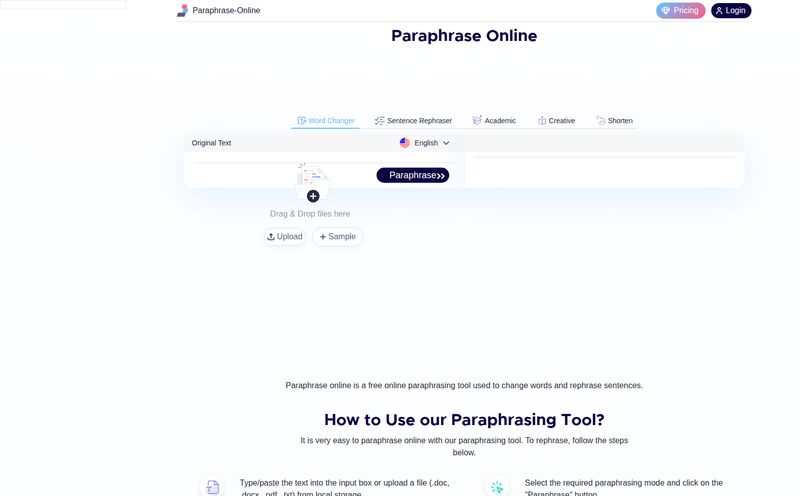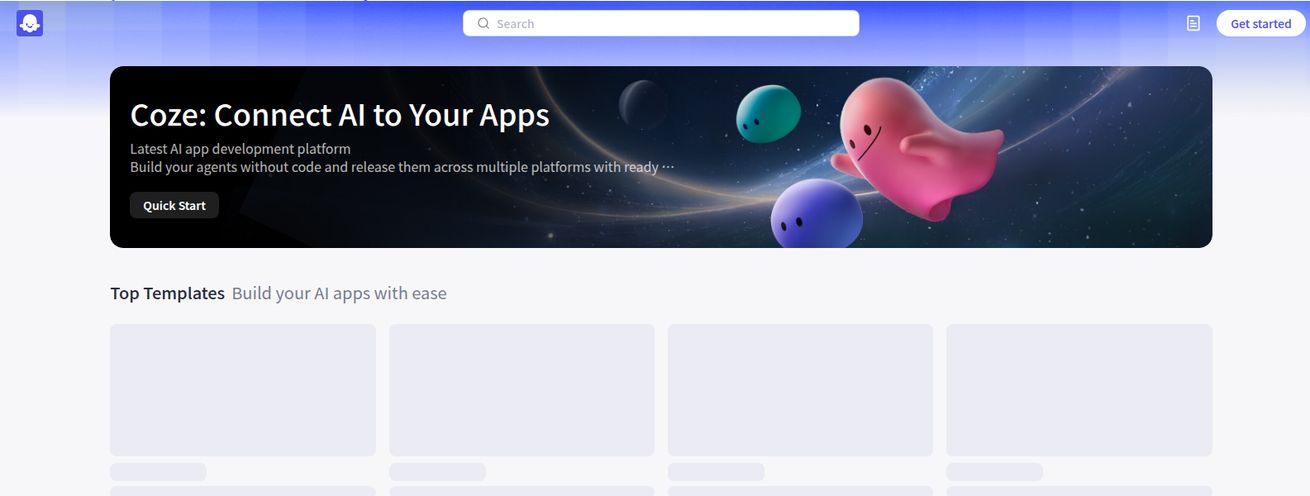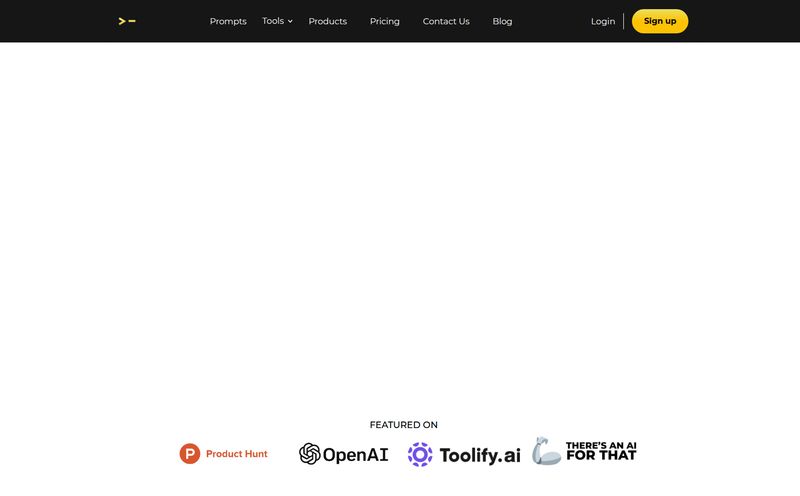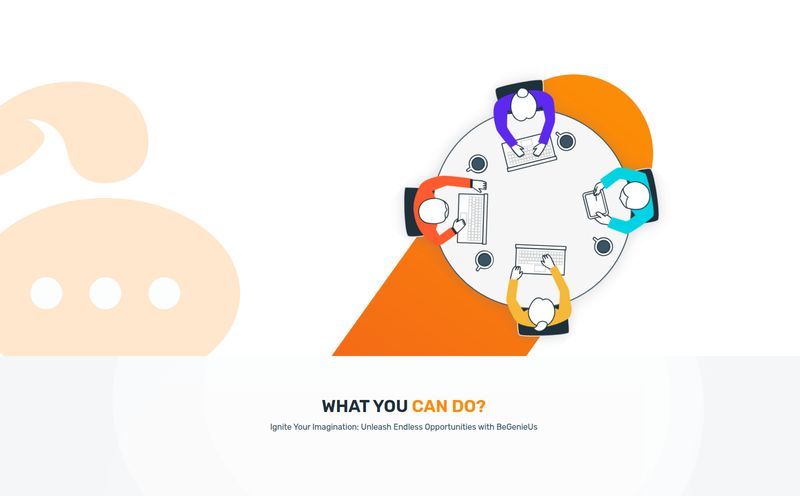If you're in healthcare, or know someone who is, you know the unspoken truth. The paperwork. It’s a beast, a multi-headed hydra that seems to grow two new forms for every one you complete. I’ve been in the digital marketing and tech trend space for years, and I’ve seen countless solutions promise to slay this dragon. Most of them... well, they fall a bit short.
So, when I first heard about MedReport, an AI-driven tool designed specifically for healthcare reporting, my professional curiosity was definitely piqued. Another contender entering the ring? You love to see it. The promise is always seductive: save time, improve accuracy, and let medical professionals get back to, you know, practicing medicine. I decided to take a look myself. And my journey, well, it started with a rather blunt "403 Forbidden" error page. Not exactly the grand entrance I expected, but hey, it makes for a better story, right? It's a perfect, if unintentional, metaphor for the hurdles new tech sometimes faces in the real world.
So, What Exactly Is MedReport Supposed to Do?
Putting aside my initial access woes, let's talk about the concept. At its core, MedReport is designed to be an intelligent assistant for any healthcare professional who finds themselves drowning in reporting tasks. Think of it as a hyper-efficient medical scribe, one that’s been trained on a massive amount of medical data and never needs a coffee break.
It uses artificial intelligence to help you generate professional, accurate healthcare reports in a fraction of the time it would normally take. The goal is to take the grunt work out of charting, transcribing, and formatting, which frees up valuable time and mental energy. For small clinics and large hospitals alike, the potential efficiency gains are, frankly, enormous.
The Core Features That Caught My Eye
When you get past the landing page (or lack thereof), the feature set is where things get interesting. It's not just about speed; it's about smart implementation. The platform seems to be built on a few key pillars. Firstly, there's the rapid and accurate report generation. This is the main selling point. The AI is meant to process patient details and generate a structured report almost instantly. Imagine finishing a patient consultation and having a near-complete report ready for review moments later. That’s the dream.
Then there's the customizable templates. This, for me, is a huge deal. I've seen too many SaaS tools fail in specialized fields because they try a one-size-fits-all approach. Medicine isn't like that. A report for an orthopedic surgeon looks vastly different from one for a cardiologist or a general practitioner. The ability to create and modify templates means MedReport can theoretically adapt to different needs, which is critical for adoption. And of course, there's secure data encryption. You simply cannot, under any circumstances, mess around with patient data. While they don't explicitly scream "HIPAA compliant" all over the place, any tool in this space has to be built with that level of security as a baseline. It's non-negotiable. Finally, they offer dedicated customer support, which is a good sign they understand that implementing a new workflow tool isn't always a plug-and-play affair.

Visit MedReport
My Honest Take on The Good and The Not-So-Good
No tool is perfect, especially in the fast-moving world of AI. From my analysis, MedReport has some serious strengths, but also a few things I'd tell any practice manager to keep in mind.
The Upside of This AI Assistant
The most obvious advantage is the time saved. Hours spent on administrative tasks are hours not spent on patient care, research, or even just decompressing from a demanding job. The user interface is also touted as being easy to use, which is a major plus. The last thing a burnt-out doctor needs is a tool with a learning curve steeper than Mount Everest. An intuitive design means faster adoption and less friction for the entire team.
The Potential Hiccups to Watch Out For
On the other side of the coin, there are a couple of practical realities. The platform apparently requires some initial setup and template customization. This isn't really a 'con' so much as a reality check. You have to invest a little time upfront to tailor the system to your workflow. You can't just unbox it and expect miracles on day one.
The bigger, more philosophical issue is the reliance on AI accuracy. The 'Garbage In, Garbage Out' principle applies here more than anywhere. The quality of the AI's output is directly dependent on the quality of the details you provide. This means it’s an assistant, not a replacement. A medical professional must always, always give the final review and sign-off. It’s a powerful tool for drafting, but the ultimate responsibility remains human. And that’s how it should be.
Let's Talk About a Big Question... The Price Tag
So, how much does this magical time-saving machine cost? That's the million-dollar question, and right now, it’s unanswered. The MedReport site doesn't list any pricing tiers. This is a pretty common strategy for B2B and specialized software; they want you to contact them for a demo and a custom quote.
Personally, I find opaque pricing a bit frustrating. As a buyer, I want to have at least a ballpark idea before I commit to a sales call. The likely reason is that the price probably varies based on the size of the practice, the number of users, and maybe the level of support required. It makes business sense, but it does create a barrier for smaller practices just trying to gauge if a tool is even within their budget. It felt a bit like that 403 error page I hit earlier—a wall preventing me from getting the complete picture.
The Bigger Picture on AI in Modern Healthcare
Stepping back from MedReport specifically, it’s impossible to ignore the seismic shift AI is causing in healthcare. We're seeing it in everything from diagnostic imaging, where AIs are getting scarily good at spotting anomalies in scans, to predictive analytics that can forecast disease outbreaks. A 2023 study in The Lancet Digital Health explored this very topic, noting the immense potential but also the ethical and practical challenges ahead. Tools like MedReport are just one piece of this larger puzzle. They are the practical, front-line applications of AI that focus on solving one of the most persistent problems in the industry: administrative bloat.
Frequently Asked Questions About MedReport
Is MedReport secure enough for sensitive patient data?
Yes, the platform emphasizes its use of secure data encryption. While you should always perform your own due diligence, security is a foundational feature for any tool handling patient health information, with standards like HIPAA being the benchmark in the US.
Who is the ideal user for MedReport?
It's designed for a wide range of healthcare professionals, including doctors, nurses, specialists, and clinic administrators. Essentially, anyone who is responsible for creating and managing medical reports could benefit from it.
Do I need to be a tech expert to use it?
It seems not. The platform is described as having an easy-to-use interface. However, you should expect to spend some time on initial setup and customizing your report templates to fit your specific needs.
Can I use MedReport for my specific medical specialty?
Yes, that's the whole point of its customizable templates. Whether you're in dermatology, psychology, or physical therapy, you can tailor the report structures to match the requirements of your field.
How much does MedReport cost?
The pricing is not publicly listed. You will likely need to contact their sales team for a demonstration and receive a quote tailored to the size and needs of your practice.
So, Is MedReport the Prescription for Your Paperwork Headaches?
After digging in, I see MedReport as a genuinely promising tool. It’s not magic, and it won't single-handedly solve all of healthcare's problems. It requires thoughtful implementation and, most importantly, human oversight. But as an intelligent assistant designed to tackle the relentless grind of reporting, it has the potential to be a game-changer for many practices.
It represents a clear step in the right direction—using technology not to replace human expertise, but to augment it, freeing up our brightest medical minds to do what they do best. The future of healthcare administration is undoubtedly being written in code, and tools like MedReport are a fascinating, if sometimes inaccessible, chapter in that ongoing story.
Reference and Sources
- MedReport Official Website (Note: As of this writing, access to some pages may be restricted.)
- Kelly, C. J., et al. (2023). "Key challenges for delivering clinical impact with artificial intelligence." The Lancet Digital Health, 5(3), e163-e169. https://www.thelancet.com/journals/landig/article/PIIS2589-7500(23)00002-3/fulltext



